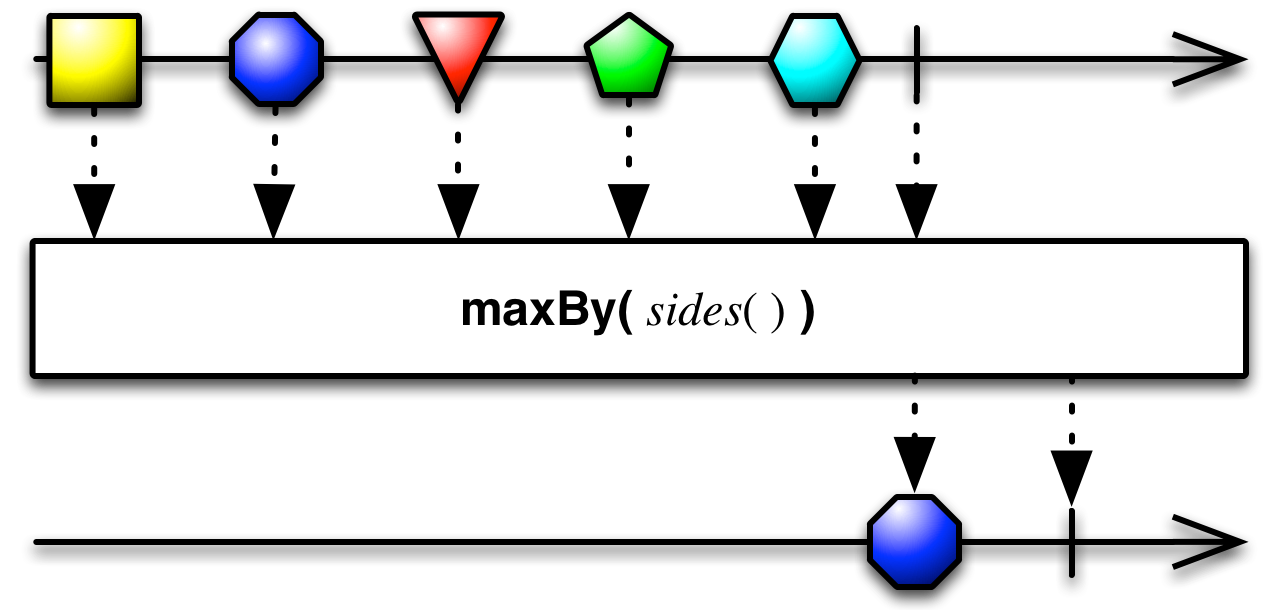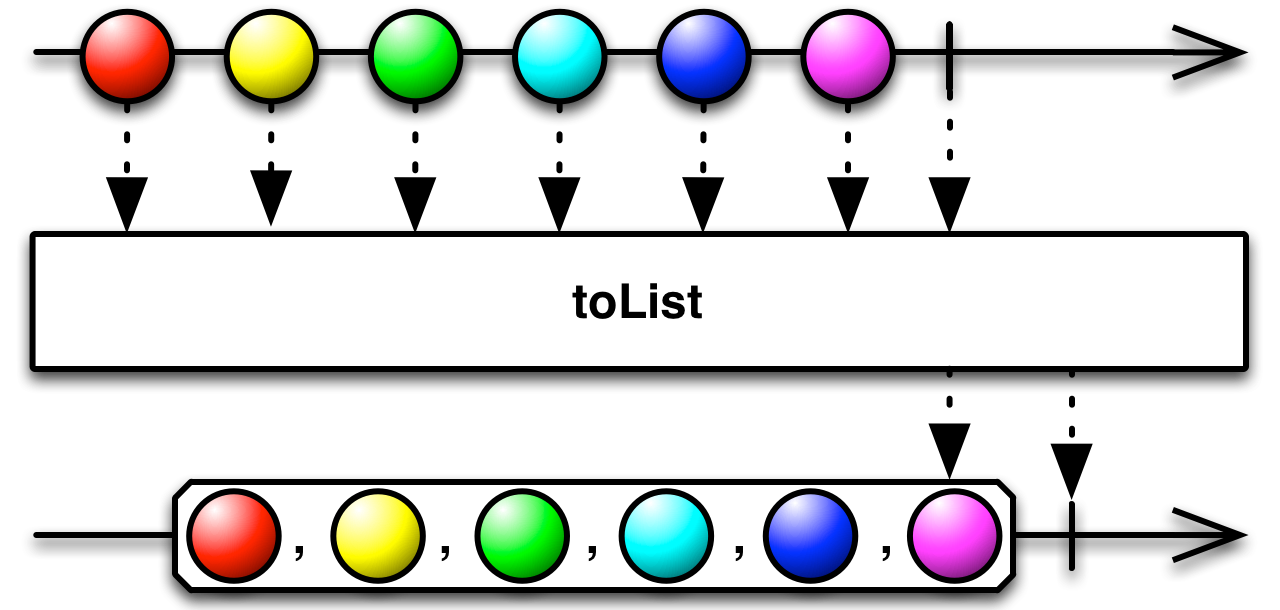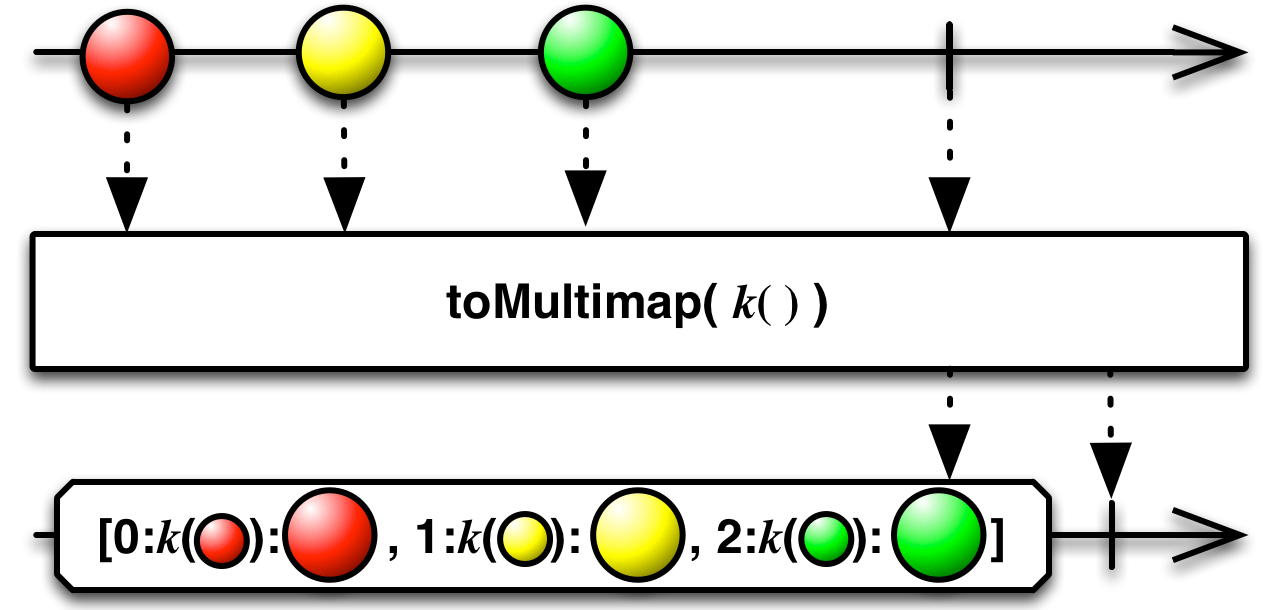-
Notifications
You must be signed in to change notification settings - Fork 7.6k
Mathematical and Aggregate Operators
This section explains operators that perform mathematical or other operations over an entire sequence of items emitted by an Observable. Because these operations must wait for the source Observable to complete emitting items before they can construct their own emissions (and must usually buffer these items), these operators are dangerous to use on Observables that may have very long or infinite sequences.
-
averageInteger( )— calculates the average of Integers emitted by an Observable and emits this average -
averageLong( )— calculates the average of Longs emitted by an Observable and emits this average -
averageFloat( )— calculates the average of Floats emitted by an Observable and emits this average -
averageDouble( )— calculates the average of Doubles emitted by an Observable and emits this average -
concat( )— concatenate two or more Observables sequentially -
count( )andlongCount( )— counts the number of items emitted by an Observable and emits this count -
max( )— emits the maximum value emitted by a source Observable -
maxBy( )— emits the item emitted by the source Observable that has the maximum key value -
min( )— emits the minimum value emitted by a source Observable -
minBy( )— emits the item emitted by the source Observable that has the minimum key value -
reduce( )— apply a function to each emitted item, sequentially, and emit only the final accumulated value -
sumInteger( )— adds the Integers emitted by an Observable and emits this sum -
sumLong( )— adds the Longs emitted by an Observable and emits this sum -
sumFloat( )— adds the Floats emitted by an Observable and emits this sum -
sumDouble( )— adds the Doubles emitted by an Observable and emits this sum -
toList( )— collect all items from an Observable and emit them as a single List -
toSortedList( )— collect all items from an Observable and emit them as a single, sorted List -
toMap( )— convert the sequence of items emitted by an Observable into a map keyed by a specified key function -
toMultiMap( )— convert the sequence of items emitted by an Observable into an ArrayList that is also a map keyed by a specified key function

The averageInteger( ) method returns an Observable that calculates the average of the Integers emitted by a source Observable and then emits this average as an Integer, as shown in the following sample code:
def myObservable = Observable.create({ aSubscriber ->
if(FALSE == aSubscriber.isUnsuscribed()) aSubscriber.onNext(4);
if(FALSE == aSubscriber.isUnsuscribed()) aSubscriber.onNext(3);
if(FALSE == aSubscriber.isUnsuscribed()) aSubscriber.onNext(2);
if(FALSE == aSubscriber.isUnsuscribed()) aSubscriber.onNext(1);
if(FALSE == aSubscriber.isUnsuscribed()) aSubscriber.onCompleted();
});
myObservable.averageInteger().subscribe(
{ println(it); }, // onNext
{ println("Error encountered"); }, // onError
{ println("Sequence complete"); } // onCompleted
);2
Sequence complete
There are also specialized "average" methods for Longs, Floats, and Doubles (averageLong( ), averageFloat( ), and averageDouble( )).
You can also average not the items themselves but the results of a function applied to each item.

Note that any of these methods will fail with an IllegalArgumentException if the source Observable does not emit any items.
- javadoc:
averageInteger(),averageLong(),averageFloat(), andaverageDouble() - RxJS:
average - Linq:
Average - Introduction to Rx: Min, Max, Sum, and Average

You can concatenate the output of multiple Observables so that they act like a single Observable, with all of the items emitted by the first Observable being emitted before any of the items emitted by the second Observable, by using the concat( ) method:
myConcatenatedObservable = Observable.concat(observable1, observable2, ... );For example, the following code concatenates the 'odds' and 'evens' Observables into a single Observable:
odds = Observable.from([1, 3, 5, 7]);
evens = Observable.from([2, 4, 6]);
Observable.concat(odds, evens).subscribe(
{ println(it); }, // onNext
{ println("Error: " + it.getMessage()); }, // onError
{ println("Sequence complete"); } // onCompleted
);1
3
5
7
2
4
6
Sequence complete
Instead of passing multiple Observables into concat( ), you could also pass in a List<> of Observables, or even an Observable that emits Observables, and concat( ) will concatenate their output into the output of a single Observable.
- javadoc:
concat(observable1, observable2, ...) - RxJS:
concat - Linq:
Concat - Introduction to Rx: Concat

The count( ) method returns an Observable that emits a single item: an Integer that represents the total number of items emitted by the source Observable, as shown in the following sample code:
def myObservable = Observable.create({ aSubscriber ->
if(FALSE == aSubscriber.isUnsuscribed()) aSubscriber.onNext('Three');
if(FALSE == aSubscriber.isUnsuscribed()) aSubscriber.onNext('Two');
if(FALSE == aSubscriber.isUnsuscribed()) aSubscriber.onNext('One');
if(FALSE == aSubscriber.isUnsuscribed()) aSubscriber.onCompleted();
});
myObservable.count().subscribe(
{ println(it); }, // onNext
{ println("Error: " + it.getMessage()); }, // onError
{ println("Sequence complete"); } // onCompleted
);3
Sequence complete
longCount( ) is essentially the same, but emits its item as a Long rather than an Integer.
- javadoc:
count() - javadoc:
longCount() - RxJS:
count - Linq:
Count - Introduction to Rx: Count

The max( ) operator waits until the source Observable completes, and then emits the item emitted by the source Observable that had the highest value, before itself completing. If more than one item has this maximum value, max( ) emits the last such item. You may optionally pass in a comparator that max( ) will use to determine the maximum of two emitted items.
- javadoc:
max(source) - javadoc:
max(comparator) - Linq:
Max - RxJS:
max - Intro to Rx: Max and Min

The maxBy( ) operator is similar to max( ) but instead of emitting the maximum item emitted by the source Observable, it emits the last item from the source Observable that has the maximum key, where that key is generated by a function applied to each item. You supply this function.
- javadoc:
maxBy(selector) - javadoc:
maxBy(selector,comparator) - Linq:
MaxBy - RxJS:
maxBy - Intro to Rx: MinBy and MaxBy

The min( ) operator waits until the source Observable completes, and then emits the item emitted by the source Observable that had the lowest value, before itself completing. If more than one item has this minimum value, min( ) emits the last such item. You may optionally pass in a comparator that min( ) will use to determine the minimum of two emitted items.
- javadoc:
min(source) - javadoc:
min(comparator) - Linq:
Min - RxJS:
min - Intro to Rx: Max and Min

The minBy( ) operator is similar to min( ) but instead of emitting the minimum item emitted by the source Observable, it emits the last item from the source Observable that has the minimum key, where that key is generated by a function applied to each item. You supply this function.
- javadoc:
minBy(selector) - javadoc:
minBy(selector,comparator) - Linq:
MinBy - RxJS:
minBy - Intro to Rx: MinBy and MaxBy

The reduce( ) method returns an Observable that applies a function of your choosing to the first item emitted by a source Observable, then feeds the result of that function along with the second item emitted by the source Observable into the same function, then feeds the result of that function along with the third item into the same function, and so on until all items have been emitted by the source Observable. Then it emits the final result from the final call to your function as the sole output from the returned Observable.
Note that if the source Observable does not emit any items, reduce( ) will fail with an IllegalArgumentException.
For example, the following code uses reduce( ) to compute, and then emit as an Observable, the sum of the numbers emitted by the source Observable:
numbers = Observable.from([1, 2, 3, 4, 5]);
numbers.reduce({ a, b -> a+b }).subscribe(
{ println(it); }, // onNext
{ println("Error: " + it.getMessage()); }, // onError
{ println("Sequence complete"); } // onCompleted
);15
Sequence complete
This technique, which is called “reduce” in the RxJava context, is sometimes called “aggregate,” “fold,” “accumulate,” “compress,” or “inject” in other programming arenas.
There is also a version of reduce( ) to which you can pass a seed item in addition to an accumulator function:
my_observable.reduce(initial_seed, accumulator_closure)Note that passing a null seed is not the same as not passing a seed. The behavior will be different. If you pass a seed of null, you will be seeding your reduction with the item null. Note also that if you do pass in a seed, and the source Observable emits no items, reduce will emit the seed and complete normally without error.
Imagine you have access to an Observable that emits a sequence of "Movie" objects that correspond to the "coming soon" movies from a theater. These objects include a number of items of information about the movie, including its title and opening day. You could use reduce to convert this sequence of Movie objects into a single list of titles, like this:
getComingSoonSequence()
.reduce([], { theList, video ->
theList.add("'" + video.getTitle() + "' (" + video.getOpen() + ")");
return(theList);
}).subscribe({ println("Coming Soon: " + it) });Which might result in something like this:
Coming Soon: ['Botso' (Sept. 30), 'The Act of Killing' (Sept. 30), 'Europa Report' (Sept. 27), 'Salinger' (Sept.27), 'In a World' (Sept. 27)]
- javadoc:
reduce(accumulator) - javadoc:
reduce(initialValue, accumulator) - RxJS:
aggregate - Linq:
Aggregate - Introduction to Rx: Aggregate

The sumInteger( ) method returns an Observable that adds the Integers emitted by a source Observable and then emits this sum as an Integer, as shown in the following sample code:
def myObservable = Observable.create({ aSubscriber ->
if(FALSE == aSubscriber.isUnsuscribed()) aSubscriber.onNext(4);
if(FALSE == aSubscriber.isUnsuscribed()) aSubscriber.onNext(3);
if(FALSE == aSubscriber.isUnsuscribed()) aSubscriber.onNext(2);
if(FALSE == aSubscriber.isUnsuscribed()) aSubscriber.onNext(1);
if(FALSE == aSubscriber.isUnsuscribed()) aSubscriber.onCompleted();
});
myObservable.sumInteger().subscribe(
{ println(it); }, // onNext
{ println("Error encountered"); }, // onError
{ println("Sequence complete"); } // onCompleted
);10
Sequence complete
There are also specialized "sum" methods for Longs, Floats, and Doubles (sumLong( ), sumFloat( ), and sumDouble( )).
You can also sum not the items themselves but the results of a function applied to each item.

- javadoc:
sumInteger(),sumLong(),sumFloat(), andsumDouble() - RxJS:
sum - Linq:
Sum - Introduction to Rx: Min, Max, Sum, and Average

Normally, an Observable that emits multiple items will do so by invoking its Subscriber’s onNext method for each such item. You can change this behavior, instructing the Observable to compose a list of these multiple items and then to invoke the Subscriber’s onNext method once, passing it the entire list, by calling the Observable’s toList( ) method prior to calling its subscribe( ) method. For example:
Observable.tolist(myObservable).subscribe({ myListOfSomething -> do something useful with the list });For example, the following rather pointless code takes a list of integers, converts it into an Observable, then converts that Observable into one that emits the original list as a single item:
numbers = Observable.from([1, 2, 3, 4, 5, 6, 7, 8, 9]);
numbers.toList().subscribe(
{ println(it); }, // onNext
{ println("Error: " + it.getMessage()); }, // onError
{ println("Sequence complete"); } // onCompleted
);[1, 2, 3, 4, 5, 6, 7, 8, 9]
Sequence complete
If the source Observable invokes onCompleted before emitting any items, toList( ) will emit an empty list before invoking onCompleted. If the source Observable invokes onError, toList( ) will in turn invoke the onError methods of its Subscribers.

The toSortedList( ) method behaves much like toList( ) except that it sorts the resulting list. By default it sorts the list naturally in ascending order by means of the Comparable interface. If any of the items emitted by the Observable does not support Comparable with respect to the type of every other item emitted by the Observable, toSortedList( ) will throw an exception. However, you can change this default behavior by also passing in to toSortedList( ) a function that takes as its parameters two items and returns a number; toSortedList( ) will then use that function instead of Comparable to sort the items.
For example, the following code takes a list of unsorted integers, converts it into an Observable, then converts that Observable into one that emits the original list in sorted form as a single item:
numbers = Observable.from([8, 6, 4, 2, 1, 3, 5, 7, 9]);
numbers.toSortedList().subscribe(
{ println(it); }, // onNext
{ println("Error: " + it.getMessage()); }, // onError
{ println("Sequence complete"); } // onCompleted
);[1, 2, 3, 4, 5, 6, 7, 8, 9]
Sequence complete
Here is an example that provides its own sorting function, in this case, one that sorts numbers according to how close to the number 5 they are:
numbers = Observable.from([8, 6, 4, 2, 1, 3, 5, 7, 9]);
numbers.toSortedList({ n, m -> Math.abs(5-n) - Math.abs(5-m) }).subscribe(
{ println(it); }, // onNext
{ println("Error: " + it.getMessage()); }, // onError
{ println("Sequence complete"); } // onCompleted
);[5, 6, 4, 3, 7, 8, 2, 1, 9]
Sequence complete
- javadoc:
toSortedList() - javadoc:
toSortedList(sortingFunction)

The toMap( ) and toMultiMap( ) methods collect the items emitted by the source Observable into a map (by default, a HashMap, but you can supply a factory function that generates another Map variety) and then emit that map. You supply a function that generates the key for each emitted item. You may also optionally supply a function that converts an emitted item into the value to be stored in the map (by default, the item itself is this value).
The toMultiMap( ) method differs from toMap( ) in that the map it generates is also an ArrayList.

- javadoc: <a href=http://netflix.github.io/RxJava/javadoc/rx/Observable.html#toMap(rx.util.functions.Func1)"">`toMap(keySelector)`
- javadoc:
toMap(keySelector,valueSelector) - javadoc:
toMap(keySelector,valueSelector,mapFactory) - javadoc:
toMultimap(keySelector) - javadoc:
toMultimap(keySelector,valueSelector) - javadoc:
toMultimap(keySelector,valueSelector,mapFactory) - javadoc:
toMultimap(keySelector,valueSelector,mapFactory,collectionFactory) - Linq:
ToLookupandToDictionary
Copyright (c) 2016-present, RxJava Contributors.
Twitter @RxJava | Gitter @RxJava